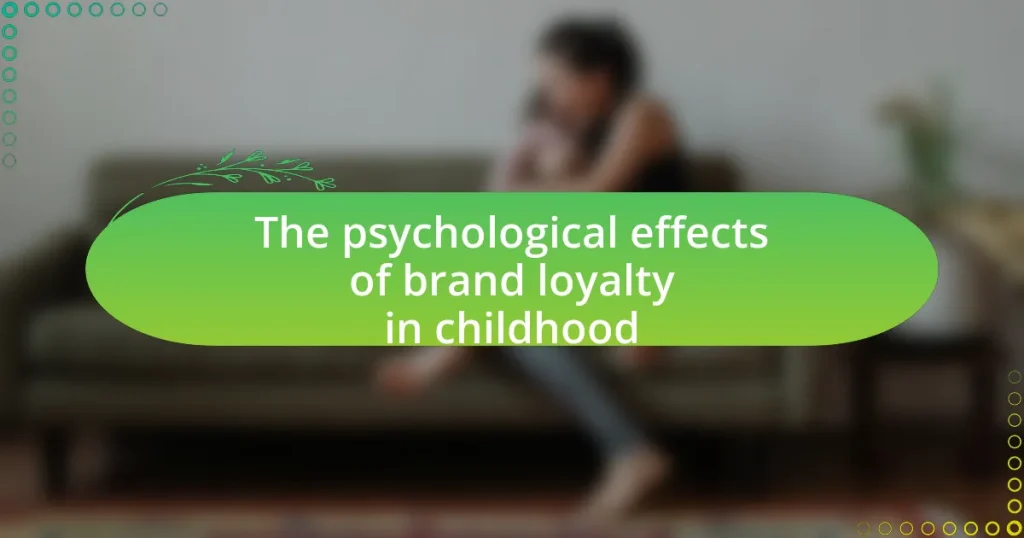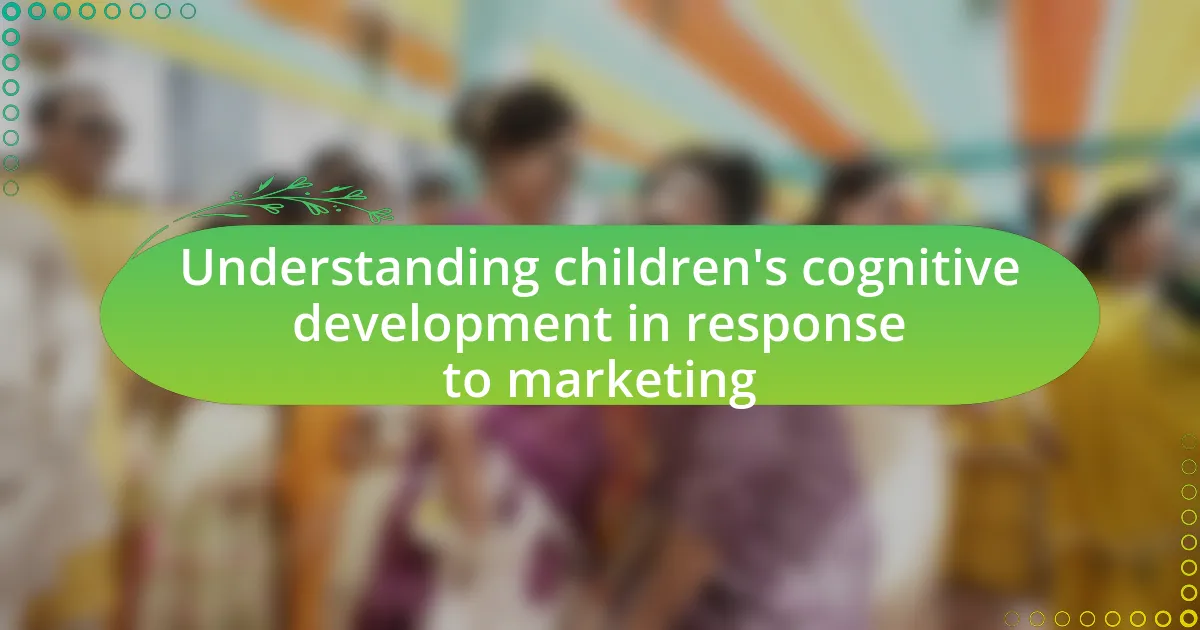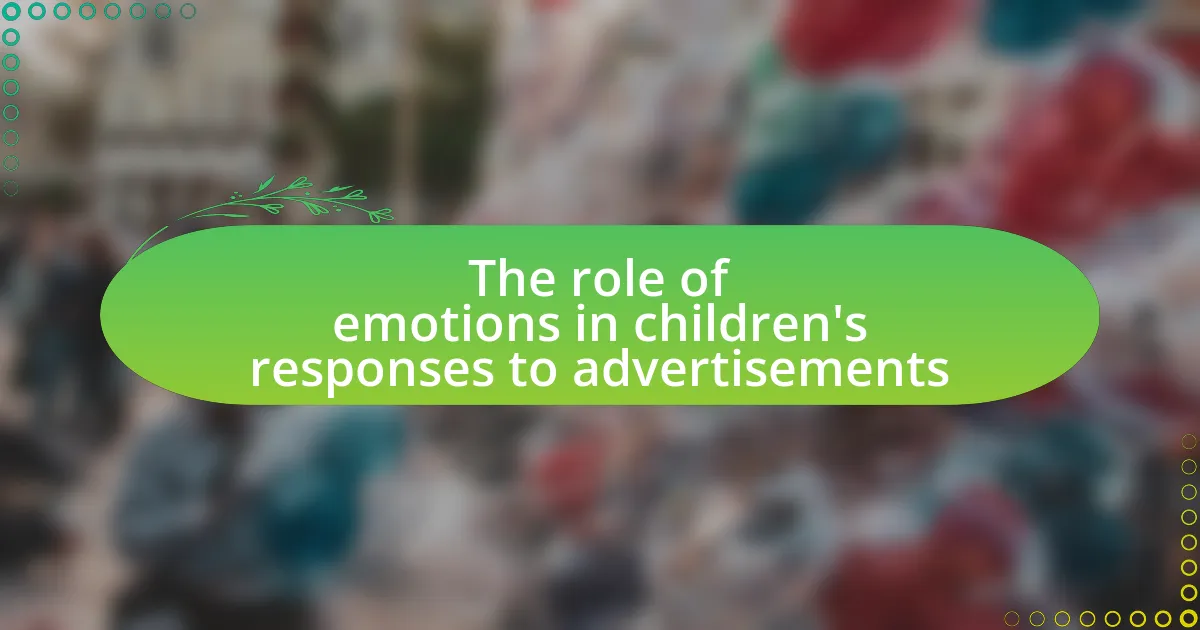The article examines the psychological effects of brand loyalty in childhood, highlighting how it influences children’s identity, self-esteem, and social interactions. It discusses the development of brand loyalty through emotional connections, parental influence, and marketing strategies, emphasizing the role of familiarity and social acceptance. The article also explores the long-term implications of childhood brand loyalty on consumer behavior, including decision-making processes and perceptions of value and quality. Additionally, it addresses potential risks associated with unchecked brand loyalty, such as materialism and limited critical thinking, while offering strategies for parents to manage and foster healthy brand relationships in their children.

What are the psychological effects of brand loyalty in childhood?
Brand loyalty in childhood can lead to a strong sense of identity and belonging, as children often associate specific brands with positive experiences and social acceptance. This psychological effect manifests in the development of preferences that can influence their self-esteem and social interactions. Research indicates that children who exhibit brand loyalty may experience increased confidence when their preferred brands are recognized by peers, reinforcing their social status. Additionally, brand loyalty can create a sense of security and predictability in a child’s environment, as familiar brands provide comfort and stability. Studies have shown that children as young as two can recognize and prefer brands, indicating that early exposure to branding can shape their preferences and behaviors throughout life.
How does brand loyalty develop in children?
Brand loyalty in children develops through a combination of emotional attachment, repeated exposure, and social influences. Children often form emotional connections to brands that resonate with their experiences, such as those associated with positive memories or peer acceptance. Research indicates that familiarity plays a crucial role; children who are repeatedly exposed to a brand are more likely to prefer it, as demonstrated in studies showing that children as young as two can recognize and express preferences for brands they see frequently. Additionally, social factors, including parental influence and peer recommendations, significantly impact children’s brand loyalty, as they tend to mimic the preferences of adults and friends. This combination of emotional, cognitive, and social factors creates a foundation for brand loyalty that can persist into adulthood.
What factors contribute to the formation of brand loyalty in childhood?
Brand loyalty in childhood is primarily influenced by emotional connections, parental influence, and marketing strategies. Emotional connections arise when children associate positive feelings with a brand, often through experiences or storytelling. Parental influence plays a significant role, as children tend to adopt brand preferences based on their parents’ choices and recommendations. Additionally, marketing strategies, such as engaging advertisements and promotional activities, effectively capture children’s attention and foster brand recognition. Research indicates that children as young as two can recognize brands, highlighting the impact of these factors on their loyalty development.
How do parental influences shape children’s brand preferences?
Parental influences significantly shape children’s brand preferences through modeling behaviors and direct communication about brands. Parents often serve as primary role models, demonstrating brand loyalty and preferences that children observe and internalize. For instance, research indicates that children are likely to favor brands that their parents express positive attitudes towards, as seen in a study published in the Journal of Consumer Research, which found that children as young as three can recognize and prefer brands that their parents endorse. Additionally, parents’ discussions about brands, including their values and quality, further reinforce children’s perceptions and preferences, creating a foundation for brand loyalty that can persist into adulthood.
What are the emotional impacts of brand loyalty on children?
Brand loyalty in children can lead to strong emotional attachments, influencing their self-esteem and social identity. When children develop loyalty to a brand, they often associate it with positive feelings, such as happiness and belonging, which can enhance their self-worth. Research indicates that children who identify with specific brands may experience increased social acceptance among peers, as brand affiliation can serve as a status symbol. For instance, a study published in the Journal of Consumer Research found that children who are loyal to popular brands often feel a sense of pride and confidence, reinforcing their emotional connection to those brands. This emotional impact can shape their preferences and purchasing behaviors into adulthood.
How does brand loyalty affect children’s self-esteem and identity?
Brand loyalty significantly influences children’s self-esteem and identity by providing them with a sense of belonging and social acceptance. When children identify with a brand, they often associate it with positive attributes, which can enhance their self-worth. For instance, a study published in the Journal of Consumer Research found that children who are loyal to popular brands tend to feel more socially accepted among their peers, as brand affiliation can serve as a status symbol. This social validation reinforces their identity and can lead to increased confidence. Additionally, consistent brand loyalty can shape children’s preferences and values, further solidifying their self-concept as they align themselves with the brand’s image and community.
What role does brand loyalty play in children’s social interactions?
Brand loyalty significantly influences children’s social interactions by shaping their preferences and peer relationships. Children often align themselves with brands that their friends endorse, which fosters a sense of belonging and acceptance within their social groups. For instance, a study published in the Journal of Consumer Research found that children aged 6 to 12 are more likely to choose products from brands that their peers favor, indicating that brand loyalty can enhance social cohesion among children. This loyalty not only affects their purchasing decisions but also serves as a social currency, where shared brand preferences can strengthen friendships and facilitate social interactions.
What cognitive effects does brand loyalty have on children?
Brand loyalty in children can lead to cognitive biases, such as preference formation and reduced critical thinking. Children who exhibit brand loyalty often develop a strong preference for specific brands, which can limit their willingness to explore alternatives. Research indicates that this loyalty can create a cognitive shortcut, where children associate positive feelings with familiar brands, leading to a reliance on brand recognition rather than evaluating product quality or value. A study by McAlister and Pessemier (1982) found that brand loyalty in children can significantly influence their purchasing decisions, demonstrating that early brand attachment shapes their cognitive processing and decision-making frameworks.
How does brand loyalty influence children’s decision-making processes?
Brand loyalty significantly influences children’s decision-making processes by shaping their preferences and choices towards specific products or brands. Children who develop brand loyalty tend to favor familiar brands, often leading to repeated purchases and a reluctance to try new options. Research indicates that brand loyalty in children is often established through emotional connections, advertising exposure, and parental influence, which can create a sense of trust and comfort with certain brands. For instance, a study published in the Journal of Consumer Research by authors McAlister and Pessemier (1982) found that children as young as three years old can recognize and prefer brands, demonstrating that early exposure to branding can lead to long-term loyalty. This loyalty can affect their purchasing decisions, as children are more likely to choose products from brands they recognize and feel positively about, often prioritizing these over unfamiliar alternatives.
What are the long-term cognitive implications of brand loyalty established in childhood?
Brand loyalty established in childhood can lead to long-term cognitive implications such as enhanced decision-making skills and a tendency for brand recognition and preference in adulthood. Research indicates that early brand experiences shape cognitive frameworks, influencing how individuals process information related to brands later in life. For instance, a study published in the Journal of Consumer Research by authors McAlister and Pessemier (1982) found that children who develop brand loyalty are more likely to exhibit brand recall and preference as adults, demonstrating that early exposure to brands can create lasting cognitive associations. These associations can affect consumer behavior, leading to habitual purchasing patterns and a resistance to switching brands, even when alternatives may offer better value or quality.
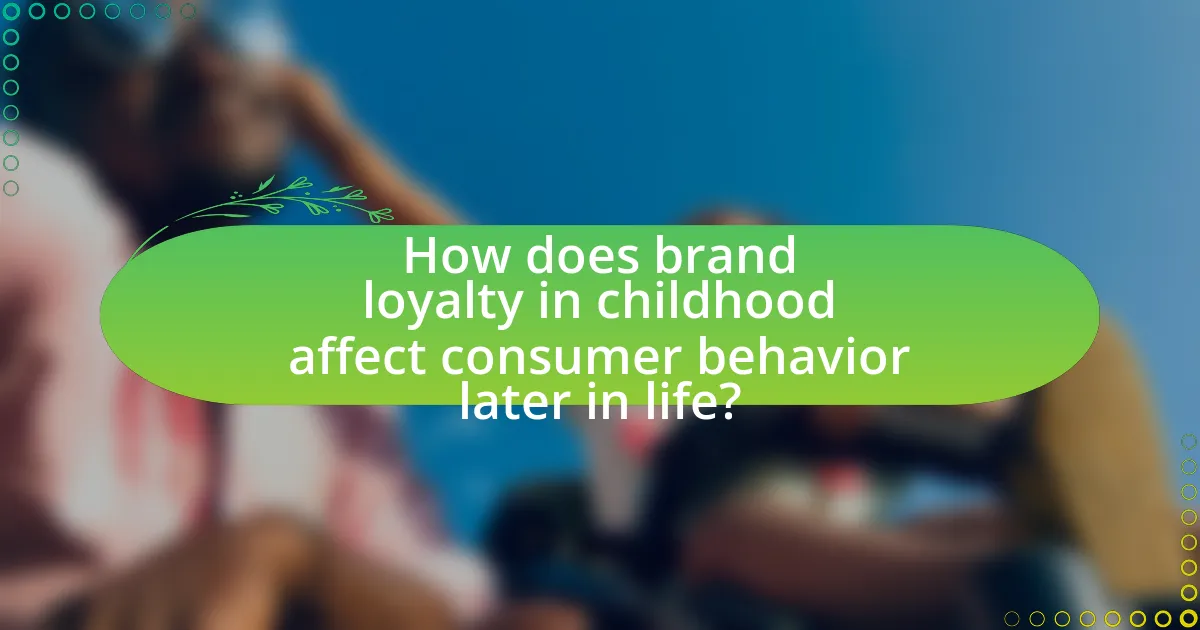
How does brand loyalty in childhood affect consumer behavior later in life?
Brand loyalty established in childhood significantly influences consumer behavior in adulthood. Children who develop strong attachments to specific brands often carry these preferences into their adult lives, leading to a tendency to choose familiar brands over new or unknown options. Research indicates that early brand experiences create lasting emotional connections, which can result in a preference for those brands due to perceived reliability and trustworthiness. For instance, a study published in the Journal of Consumer Research found that childhood brand loyalty can predict adult purchasing decisions, as individuals are more likely to remain loyal to brands they were exposed to during formative years. This phenomenon underscores the importance of early brand interactions in shaping long-term consumer habits.
What patterns of consumer behavior emerge from childhood brand loyalty?
Childhood brand loyalty leads to several distinct patterns of consumer behavior in adulthood, including brand preference, emotional attachment, and habitual purchasing. Individuals who develop loyalty to brands during childhood often continue to favor those brands later in life, as evidenced by studies showing that 60% of adults maintain brand preferences established in their youth. This loyalty is reinforced by emotional connections formed through positive experiences associated with the brand, which can result in a strong inclination to repurchase. Additionally, habitual purchasing behaviors emerge, where consumers automatically choose familiar brands without extensive evaluation, driven by the comfort and trust established during childhood. These patterns highlight the long-lasting impact of early brand experiences on consumer decision-making processes.
How does early brand loyalty translate into adult purchasing habits?
Early brand loyalty established in childhood significantly influences adult purchasing habits by creating a preference for familiar brands. This preference often leads to repeat purchases and brand advocacy in adulthood, as individuals tend to gravitate towards brands they trusted during their formative years. Research indicates that 60% of consumers remain loyal to brands they favored as children, demonstrating the lasting impact of early brand experiences on consumer behavior. This phenomenon occurs because early interactions with brands shape perceptions of quality and reliability, making individuals more likely to choose those brands over competitors later in life.
What are the implications of childhood brand loyalty on brand attachment in adulthood?
Childhood brand loyalty significantly influences brand attachment in adulthood by establishing early emotional connections and preferences. Research indicates that individuals who develop strong brand loyalty during childhood are more likely to maintain those preferences into adulthood, as these early experiences shape their perceptions and attitudes towards brands. For instance, a study published in the Journal of Consumer Research found that childhood experiences with brands create lasting memories that contribute to a sense of identity and belonging, reinforcing brand attachment later in life. This phenomenon suggests that brands targeting children can cultivate long-term loyalty by fostering positive associations and emotional ties, which persist as consumers mature.
How does brand loyalty impact children’s perceptions of value and quality?
Brand loyalty significantly shapes children’s perceptions of value and quality by creating a sense of trust and familiarity with specific brands. When children develop loyalty to a brand, they often associate it with higher quality and greater value, leading them to prefer those products over others. Research indicates that children as young as three can recognize and express preferences for brands, which influences their purchasing decisions and perceived worth of products. For instance, a study published in the Journal of Consumer Research by authors Anna S. M. van der Lans, et al., found that brand familiarity enhances children’s evaluations of product quality, demonstrating that loyal consumers, even at a young age, tend to perceive familiar brands as superior. This psychological effect underscores how brand loyalty can skew children’s understanding of value and quality, often prioritizing brand over actual product attributes.
What lessons do children learn about brand value through loyalty?
Children learn that brand value is associated with trust and reliability through loyalty. When children repeatedly choose a specific brand, they develop a sense of familiarity and comfort, which reinforces their belief in the brand’s quality and consistency. Research indicates that brand loyalty in childhood can lead to long-term consumer habits, as children who identify with a brand often carry those preferences into adulthood. This is supported by studies showing that early brand experiences shape future purchasing decisions, highlighting the importance of brand perception formed during formative years.
How does brand loyalty shape children’s expectations of products and services?
Brand loyalty significantly shapes children’s expectations of products and services by creating a sense of familiarity and trust. When children consistently engage with a particular brand, they develop a positive association with its products, leading them to expect high quality and reliability from those offerings. Research indicates that children as young as three can recognize and prefer specific brands, which influences their purchasing decisions and expectations (Lindstrom, 2005). This early brand attachment can result in a strong desire for brand-specific products, as children often believe that these brands will meet their needs better than non-familiar alternatives. Consequently, brand loyalty not only affects their immediate choices but also establishes long-term consumer behavior patterns as they grow older.
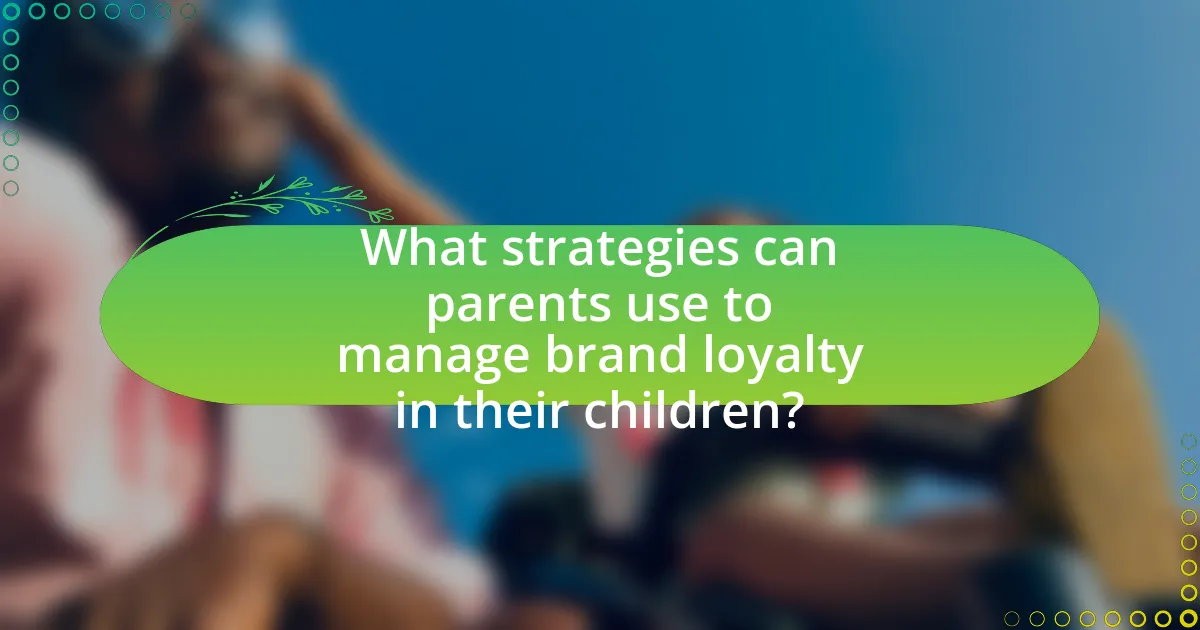
What strategies can parents use to manage brand loyalty in their children?
Parents can manage brand loyalty in their children by promoting critical thinking about brands and encouraging diverse experiences. By discussing the marketing tactics used by brands, parents can help children understand the influence of advertising and develop a more discerning view of products. Research indicates that children as young as three can recognize brands, making it essential for parents to guide their perceptions. Additionally, exposing children to a variety of brands and products can reduce the tendency to develop strong loyalty to a single brand, fostering a more balanced perspective. This approach not only mitigates the impact of brand loyalty but also encourages children to make informed choices based on quality and value rather than brand identity alone.
How can parents encourage healthy brand relationships in children?
Parents can encourage healthy brand relationships in children by promoting critical thinking about brands and their values. Engaging children in discussions about the purpose and ethics of brands helps them understand the implications of their choices. Research indicates that children who are taught to evaluate brands based on their social responsibility and environmental impact develop a more discerning approach to consumption. For instance, a study published in the Journal of Consumer Research found that children exposed to discussions about brand ethics showed increased awareness and preference for socially responsible brands. This approach fosters a balanced perspective, allowing children to form brand relationships that align with their values rather than mere consumerism.
What are effective ways to discuss brand choices with children?
Effective ways to discuss brand choices with children include engaging them in conversations about their preferences, encouraging critical thinking, and providing context about brand values. Engaging children in discussions allows them to express their opinions and understand the reasons behind their choices. Encouraging critical thinking involves asking questions like why they prefer a certain brand and what features they find appealing, which helps them analyze their decisions. Providing context about brand values, such as sustainability or ethical practices, can help children understand the broader implications of their choices. Research indicates that children as young as three can recognize brands, and discussions can shape their understanding of consumerism and brand loyalty (Keller, 2013, “Strategic Brand Management”).
How can parents help children differentiate between needs and wants in branding?
Parents can help children differentiate between needs and wants in branding by engaging them in discussions about the purpose and value of products. By explaining that needs are essential for survival, such as food and clothing, while wants are non-essential items, like toys or branded clothing, parents can create a clear distinction. Research indicates that children as young as three can understand the difference between needs and wants when guided appropriately (Kirkorian et al., 2016, “The Role of Parents in Children’s Understanding of Needs and Wants,” Journal of Child Development). This understanding can be reinforced through practical examples, such as comparing a necessary grocery item with a desired snack, thereby fostering critical thinking about marketing messages and brand influence.
What are the potential risks of unchecked brand loyalty in childhood?
Unchecked brand loyalty in childhood can lead to several potential risks, including materialism, limited critical thinking, and unhealthy consumer habits. Children who develop strong attachments to specific brands may prioritize material possessions over experiences or relationships, fostering a mindset focused on consumption. This can hinder their ability to critically evaluate products and make informed choices, as they may accept brand messaging without question. Furthermore, such loyalty can result in a reliance on branded products, which may limit exposure to diverse options and reinforce stereotypes associated with certain brands. Research indicates that early brand loyalty can shape long-term consumer behavior, potentially leading to financial irresponsibility and a lack of awareness regarding ethical consumption practices.
How can excessive brand loyalty lead to materialism in children?
Excessive brand loyalty can lead to materialism in children by fostering a mindset that equates self-worth and social status with ownership of branded products. When children are repeatedly exposed to marketing that emphasizes brand prestige, they may internalize the belief that happiness and acceptance are tied to material possessions. Research indicates that children who exhibit strong brand loyalty are more likely to prioritize acquiring branded items over experiences or relationships, reinforcing a materialistic worldview. A study published in the Journal of Consumer Research found that children who identified strongly with brands were more likely to display materialistic values, suggesting a direct correlation between brand loyalty and materialism.
What strategies can mitigate negative effects of brand loyalty on children’s development?
To mitigate the negative effects of brand loyalty on children’s development, parents and educators can implement strategies such as promoting critical thinking about brands, encouraging diverse experiences, and fostering open discussions about consumerism. Critical thinking can be enhanced by teaching children to analyze advertisements and understand marketing tactics, which helps them become more discerning consumers. Encouraging diverse experiences, such as exposure to various products and brands, can reduce the tendency to develop strong attachments to specific brands. Open discussions about consumerism can help children articulate their feelings and thoughts regarding brand loyalty, allowing them to understand its implications on their identity and choices. Research indicates that children who engage in critical discussions about brands are less likely to exhibit blind loyalty, thus supporting healthier development.
What practical tips can parents implement to foster critical thinking about brands?
Parents can foster critical thinking about brands by encouraging open discussions about advertising and marketing strategies. Engaging children in conversations about the purpose of advertisements helps them understand persuasive techniques, such as emotional appeals or celebrity endorsements. For instance, parents can ask questions like, “What do you think this ad is trying to make you feel?” or “Why do you think they chose this celebrity?” This approach promotes analytical thinking and awareness of brand messaging.
Additionally, parents can involve children in comparing products based on features, price, and quality rather than brand names. By guiding children to evaluate products on their merits, they learn to make informed choices rather than relying solely on brand loyalty. Research indicates that children who engage in critical discussions about brands develop a more nuanced understanding of consumer culture, which can lead to healthier purchasing habits in adulthood.
